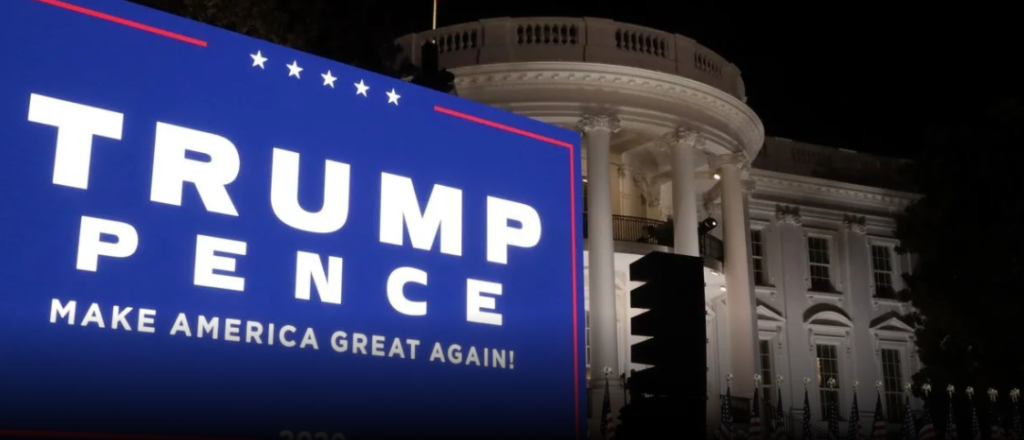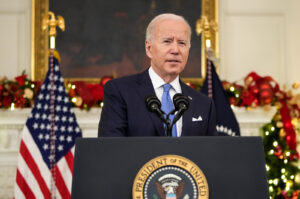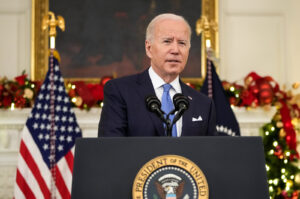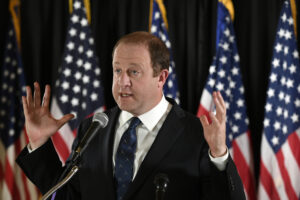Keeping it unreal: Trump and the 2020 Republican National Convention
5 min read
In an ordinary presidential election year in the United States, a montage of the summer months would find a president running for re-election amid daily media scrutiny, headlining campaign rallies, juggling media appearances, and culminating in a speech being given to a packed audience at the party’s national convention, accepting the nomination, and setting the tone for the home stretch to election day.
But this is no ordinary election year, with COVID-19 making crowded campaign rallies all but obsolete, dominating the daily news cycle, and forcing the national conventions to go virtual.
This is why President Trump’s re-election bid is only just beginning to find itself in the spotlight in the aftermath of the 2020 Republican National Convention.
To the backdrop of ongoing Black Lives Matter protests, a destructive hurricane, and a rising COVID-19 death toll, the semi-virtual Republican convention made its way from North Carolina to the White House over four carefully scripted and produced nights, shattering presidential norms, providing controversial moments, and presenting an alternate reality of Trump’s America along the way.
Unlike its Democratic counterpart the week before, the goal of the Republican convention was less about attempting to bridge the growing partisan divide in the country, and more about unifying the conservative side of politics around President Trump’s loyal but rarely expanding base of supporters.
To do this, Trump kept a tight rein on the production of the convention in the weeks leading up to it, turning it into a political reality television show featuring themes that have come to define the Trump presidency, ranging from scare tactics to “alternate facts”.
A reality TV convention
For President Trump, no stranger to the blurry concept of reality in the world of reality television, the task of directing the Republican National Convention like a reality television show would have been well within his comfort zone.
Members of his family, administration, and party were cast as passionate fans, following scripts heavily edited with positive political spin.
The convention was set in a variety of opulent and symbolic locations, ranging from the rooftop of a hotel in Jerusalem, a historic fort in Baltimore, and the South Lawn and Rose Garden at the White House, involving several controversial speakers and segments, including Secretary of State Mike Pompeo, members of the Trump family, a presidential pardon, and a naturalisation ceremony.
Read more: US 2020: Cracks widen in Trump’s re-election hopes
This politicisation of symbolic locations and presidential powers has set a dangerous precedent for future presidents and political events. The parties’ national conventions are strictly political in nature and should not be associated with entities that have, to this point, been widely accepted as being non-partisan.
While the COVID-19 pandemic created a unique set of circumstances that may not apply to future national conventions, future presidents may still feel inclined to follow Trump’s lead and politicise these symbolic institutions simply because they may feel that they can now do so with muted public backlash.
Life on a split-screen
While the production of the Republican National Convention may have lasting impacts on American politics, it is its narrative that will have a real bearing on Trump’s re-election prospects in November.
It’s something of which Trump and his fellow Republicans are certainly aware, and this was reflected in the amount of effort that was put into refining Trump’s political brand, image and record throughout the convention. There was a concerted push to appeal to voting groups previously alienated by Trump’s polarising political style and policies, including suburban women and African-Americans.
This strategy saw a majority of speakers emphasising hot-button Republican talking points such as law and order, immigration and trade, while either overlooking or touting Trump’s widely condemned response to the pandemic.
Will the upcoming presidential debates see the same “Teleprompter Trump” who stuck to the script while accepting his party’s nomination at the convention, or will he revert to the Trump from campaign rallies and Twitter who often diverts attention from the message he’s trying to convey?
During the week of the RNC, the US could be viewed in what can perhaps best be described as a split-screen of alternate realities. On one side is Trump’s version, in which the pandemic is a thing of the past, and the economy is continuing to soar despite the temporary disruption caused by it. On the other side is America’s actual reality, which depicts a country being torn apart by unresolved racial tensions, and a lacklustre political response to what is still a deadly pandemic.
While America’s reality calls for unity and honesty, President Trump’s re-election campaign is driven by his reality, and its reliance on similar themes that pushed him to victory in 2016, including fear and fake news.
While Democrats may be right in thinking that Trump can’t spin his way to a second term, as he’s now been in office for four years and no longer has the comfort of being on the outside looking in, it’s important to acknowledge that his refrains are tried and tested, and often leave him in a better standing with his supporters, who, despite his status in Washington, still view him as an outsider.
Staying on script
Now that the 2020 election finally seems to have recaptured voters’ attention, it’s worth considering how the political reality show that was the Republican National Convention will affect Trump’s campaigning style and messaging in the lead-up.
Will he build on what was considered a successful convention by starring in more virtual campaign events, or will he insist on holding in-person rallies while continuing to ignore his own administration’s social distancing guidelines?
Will the upcoming presidential debates see the same “Teleprompter Trump” who stuck to the script while accepting his party’s nomination at the convention, or will he revert to the Trump from campaign rallies and Twitter who often diverts attention from the message he’s trying to convey?
Read more: US election: Kamala Harris’ selection is both historic and smart
The answers to these questions, as with anything to do with the Trump presidency, are difficult to predict – not just because of his unpredictability as an individual, but also because of the unpredictable state of the presidential race.
While most national polls show President Trump struggling to keep up with former vice-president Joe Biden, the contest is actually much closer in various swing states, and as 2016 demonstrated, a few swing states can make or break an Electoral College victory.
So, if Trump can stick to the political script he developed in the convention, and not alienate more potential voters between now and November, his strategy of tailoring his message to appeal to a primarily Republican audience may prove to be successful. Only time will tell.
The Article was originally published on Keeping it unreal: Trump and the 2020 Republican National Convention.







